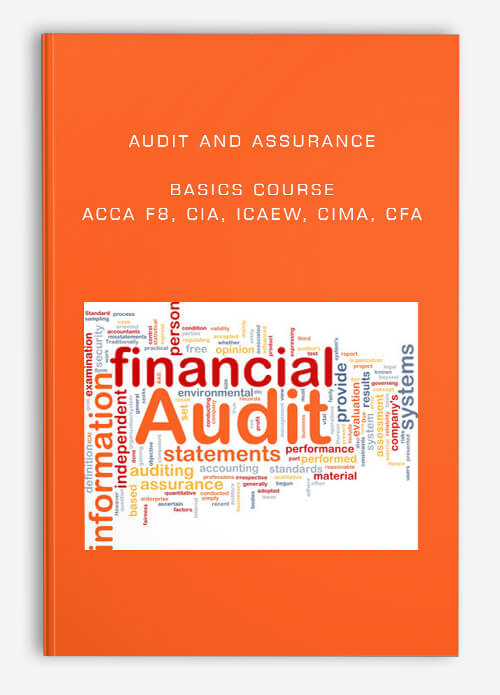
Audit And Assurance Basics Course – ACCA F8, CIA, ICAEW, CIMA, CFA
Description
This is extensive video based comprehensive course on financial audit covers basic to intermediate level knowledge on audit ad assurance. Originally prepared for ACCA Auditing paper (F8)2009, now being widely used for other related certifications i.e CIA, ICAEW, CIMA, CFA ad for all commerce student who need to study Auditing.
Prepared by the best in the field, London School of business and finance with the cutting edge Interactive©’s high quality video lecture technology, it also combines the content of:
• ATC International
• Kaplan publications
• ACCA (UK)’s own input.
to easily make it the fastest, easiest and most complete learning product on the topic.
(Based on International Standards of Audit (ISA)
The Audit and Assurance (Basic& Intermediate) is essentially divided into seven areas. The syllabus starts with the nature, purpose and scope of assurance engagements, including the statutory audit, its regulatory environment, and introduces professional ethics relating to audit and assurance. It then leads into internal audit, including the scope of internal audit as well as the differences between internal audit and external audit. The syllabus then covers a range of areas relating to an audit of financial statements. These include planning and risk assessment, evaluating internal controls, audit evidence, and a review of the financial statements. The final section then deals with reporting, including statutory audit reports, management reports, and internal audit reports.
CHAPTER 1: ASSURANCE
CHAPTER 2: AUDIT ETHICS AND REGULATIONS
CHAPTER 3: PLANNING
CHAPTER 4: AUDIT EVIDENCE
CHAPTER 5: ASSESSING AN INTERNAL CONTROL SYSTEM
CHAPTER 6: AUDIT SAMPLING
CHAPTER 7: INTERNAL CONTROLS
CHAPTER 8: SUBSTANTIVE TESTING
CHAPTER 9: AUDITING IN A COMPUTER ENVIRONMENT
CHAPTER 10: THE AUDIT REPORT
Self Help – Self Help online course
More information about Self Help:
Self-help or self-improvement is a self-guided improvement—economically, intellectually, or emotionally—often with a substantial psychological basis.
Many different self-help group programs exist, each with its own focus, techniques, associated beliefs, proponents and in some cases, leaders.
Concepts and terms originating in self-help culture and Twelve-Step culture, such as recovery, dysfunctional families, and codependency have become firmly integrated in mainstream language.
Self-help often utilizes publicly available information or support groups, on the Internet as well as in person, where people in similar situations join together.
From early examples in self-driven legal practice and home-spun advice, the connotations of the word have spread and often apply particularly to education, business,
psychology and psychotherapy, commonly distributed through the popular genre of self-help books.
According to the APA Dictionary of Psychology, potential benefits of self-help groups that professionals may not be able to provide include friendship,
emotional support, experiential knowledge, identity, meaningful roles, and a sense of belonging.













tristian –
This is Digital Download service, the course is available at Coursecui.com and Email download delivery.